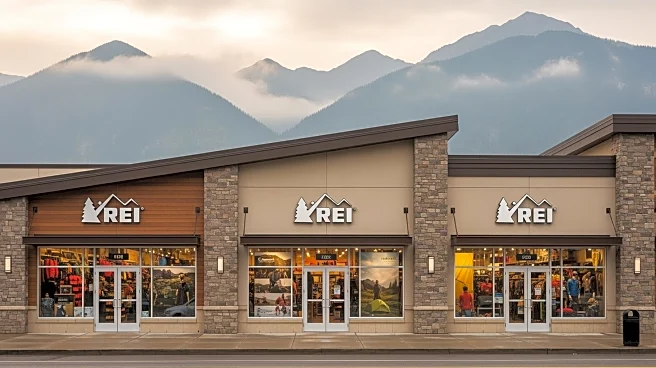What's Happening?
REI, the Seattle-based outdoor gear retailer, has announced plans to close three of its stores in 2026, including flagship locations in Boston and New York City, as well as a store in Paramus, New Jersey.
This decision comes in response to declining sales and a challenging retail environment. The company reported a net loss of $156.4 million in 2024 and a 6.2% revenue decline from the previous year. The closures are part of a broader trend affecting outdoor retailers, with consumer confidence waning and discretionary spending tightening among middle and low-income shoppers. REI's previous CEO, Eric Artz, noted that outdoor specialty retail has experienced four quarters of decline, a trend that has been worsening. Despite these challenges, REI has opened new stores and is implementing a strategic plan to adapt to evolving market conditions.
Why It's Important?
The closure of REI stores highlights the ongoing struggles faced by the outdoor retail industry, which saw a surge in consumer spending during the COVID-19 pandemic but is now experiencing a downturn. This trend reflects broader economic challenges, including increased tariffs and rising costs, which are impacting consumer spending habits. The closures may affect local economies and communities that rely on these stores for employment and retail activity. Additionally, REI's strategic shifts indicate a need for retailers to adapt to changing consumer preferences and market conditions to ensure long-term success.
What's Next?
REI plans to continue serving its members and customers at the affected locations until their closure in 2026. The company is focusing on a new strategic plan, 'Peak 28: Ascending Together,' aimed at transforming its operations and positioning itself as a trusted retailer for outdoor enthusiasts. This plan involves making difficult choices and evolving the way the company operates over the next few years. The closures may prompt other outdoor retailers to reassess their strategies and adapt to the changing retail landscape.
Beyond the Headlines
The decision to close stores may have deeper implications for the outdoor retail industry, including potential shifts in consumer behavior and the need for retailers to innovate and offer unique experiences to attract customers. The closures also raise questions about the sustainability of traditional retail models in the face of economic pressures and changing consumer expectations.










